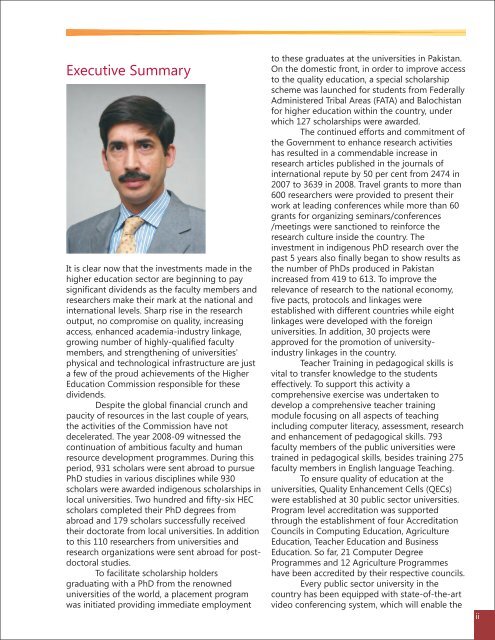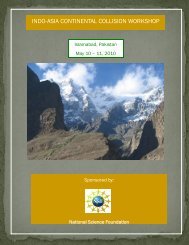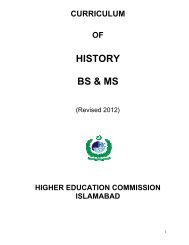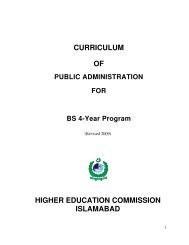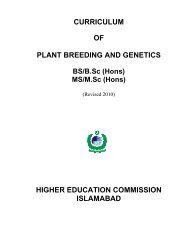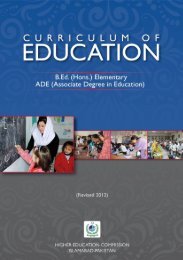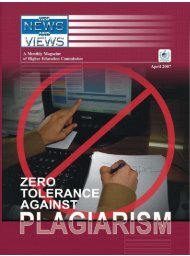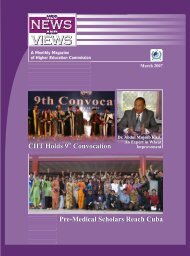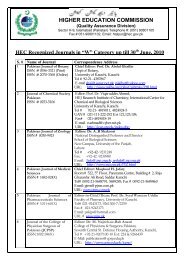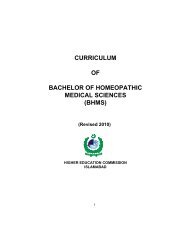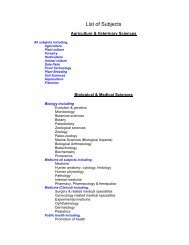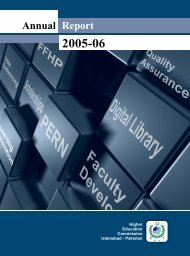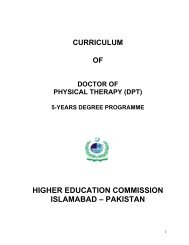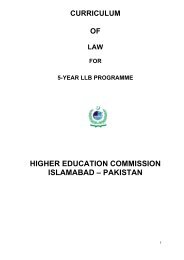Annual Report 2008-09.pdf - Higher Education Commission
Annual Report 2008-09.pdf - Higher Education Commission
Annual Report 2008-09.pdf - Higher Education Commission
You also want an ePaper? Increase the reach of your titles
YUMPU automatically turns print PDFs into web optimized ePapers that Google loves.
ii<br />
Executive Summary<br />
It is clear now that the investments made in the<br />
higher education sector are beginning to pay<br />
significant dividends as the faculty members and<br />
researchers make their mark at the national and<br />
international levels. Sharp rise in the research<br />
output, no compromise on quality, increasing<br />
access, enhanced academia-industry linkage,<br />
growing number of highly-qualified faculty<br />
members, and strengthening of universities'<br />
physical and technological infrastructure are just<br />
a few of the proud achievements of the <strong>Higher</strong><br />
<strong>Education</strong> <strong>Commission</strong> responsible for these<br />
dividends.<br />
Despite the global financial crunch and<br />
paucity of resources in the last couple of years,<br />
the activities of the <strong>Commission</strong> have not<br />
decelerated. The year <strong>2008</strong>-09 witnessed the<br />
continuation of ambitious faculty and human<br />
resource development programmes. During this<br />
period, 931 scholars were sent abroad to pursue<br />
PhD studies in various disciplines while 930<br />
scholars were awarded indigenous scholarships in<br />
local universities. Two hundred and fifty-six HEC<br />
scholars completed their PhD degrees from<br />
abroad and 179 scholars successfully received<br />
their doctorate from local universities. In addition<br />
to this 110 researchers from universities and<br />
research organizations were sent abroad for postdoctoral<br />
studies.<br />
To facilitate scholarship holders<br />
graduating with a PhD from the renowned<br />
universities of the world, a placement program<br />
was initiated providing immediate employment<br />
to these graduates at the universities in Pakistan.<br />
On the domestic front, in order to improve access<br />
to the quality education, a special scholarship<br />
scheme was launched for students from Federally<br />
Administered Tribal Areas (FATA) and Balochistan<br />
for higher education within the country, under<br />
which 127 scholarships were awarded.<br />
The continued efforts and commitment of<br />
the Government to enhance research activities<br />
has resulted in a commendable increase in<br />
research articles published in the journals of<br />
international repute by 50 per cent from 2474 in<br />
2007 to 3639 in <strong>2008</strong>. Travel grants to more than<br />
600 researchers were provided to present their<br />
work at leading conferences while more than 60<br />
grants for organizing seminars/conferences<br />
/meetings were sanctioned to reinforce the<br />
research culture inside the country. The<br />
investment in indigenous PhD research over the<br />
past 5 years also finally began to show results as<br />
the number of PhDs produced in Pakistan<br />
increased from 419 to 613. To improve the<br />
relevance of research to the national economy,<br />
five pacts, protocols and linkages were<br />
established with different countries while eight<br />
linkages were developed with the foreign<br />
universities. In addition, 30 projects were<br />
approved for the promotion of universityindustry<br />
linkages in the country.<br />
Teacher Training in pedagogical skills is<br />
vital to transfer knowledge to the students<br />
effectively. To support this activity a<br />
comprehensive exercise was undertaken to<br />
develop a comprehensive teacher training<br />
module focusing on all aspects of teaching<br />
including computer literacy, assessment, research<br />
and enhancement of pedagogical skills. 793<br />
faculty members of the public universities were<br />
trained in pedagogical skills, besides training 275<br />
faculty members in English language Teaching.<br />
To ensure quality of education at the<br />
universities, Quality Enhancement Cells (QECs)<br />
were established at 30 public sector universities.<br />
Program level accreditation was supported<br />
through the establishment of four Accreditation<br />
Councils in Computing <strong>Education</strong>, Agriculture<br />
<strong>Education</strong>, Teacher <strong>Education</strong> and Business<br />
<strong>Education</strong>. So far, 21 Computer Degree<br />
Programmes and 12 Agriculture Programmes<br />
have been accredited by their respective councils.<br />
Every public sector university in the<br />
country has been equipped with state-of-the-art<br />
video conferencing system, which will enable the


